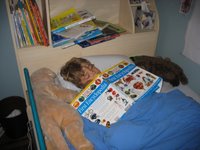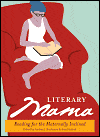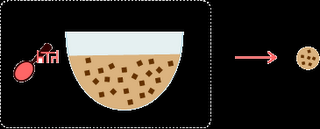
On the one hand, I could say–with a great sigh of relief and a handful of salt tossed over my shoulder– that it has never happened to me.
On the other hand, I could say that my eight years in graduate school (and the three years’ office work before that) were a protracted block, a self-imposed detour from the writing I should really have been doing the whole time, an elaborate (and ultimately expensive) procrastinatory ploy.
I’m talking about writer’s block, of course, a subject that I’ve been thinking much more seriously about since reading Susan O’Doherty’s sharp, smart, and sensitive Getting Unstuck Without Coming Unglued: A Woman’s Guide to Unblocking Creativity.
Before I go further, I should say that I am not an unbiased reviewer. I first discovered Sue’s work in Andrea Buchanan’s anthology, It’s a Boy; her beautiful essay, “The Velvet Underground,” about her music-loving, costume jewelry-wearing son, Ben, struck a chord with me, the mother of a Ben who used to wear “dress-up hair” to school. I came across Sue’s work next in Jessica Berger Gross’s anthology, About What Was Lost; “The Road Home” details, with agonizing honesty, her journey through multiple miscarriages to motherhood. When my co-editor and I were collecting essays for Mama, PhD, I remembered “The Road Home” and wondered if Sue might have a story to tell for the anthology. Indeed she did, and in working with her to edit her essay and pave the way for its publication, I’ve come to respect her and admire her writing even more.
So when I saw that MotherTalk was enlisting bloggers to review her book, I signed up, looking forward to reading a book I knew I’d enjoy, despite thinking, mistakenly, that it wouldn’t really have much to say to me.
But here’s the thing: my truth, of course, is more complicated than the two versions I offer in the first two paragraphs above. I would never say that graduate school was a waste of time or even a detour from a more satisfying writing life. I did a lot of good writing in graduate school, including a very readable 300 page dissertation. Graduate school, and the courses I took and taught, gave me a great framework for reading and writing that I draw on to this day, and I’m proud to have earned my doctorate.
Still, Sue’s book has made me wonder for the first time whether if I’d skipped grad school and stayed at work in publishing, would I have kept noodling away at the workplace novel I started at my desk? Would I have continued adding sentences between phone calls and correspondence? Is there enough of a writer in me that I would have kept at it, after work, and on lunch hours? Or would something else have come up to interfere with that writing?
Maybe, maybe someday I’ll dig out those fragmented bits of that novel, dust it off, and see if it might still have life in it. In the meantime, though, here I am, seven years post-doc and five years into motherhood, developing a different and very fulfilling writing career. At the moment, I have more ideas than time to write them all out. I can gaze out my window and see writer’s block just hovering out there, past the trees in my neighbor’s yard, but here come Eli and Ben, thundering down the hall giggling, trying unsuccessfully to sneak up on me at my desk, and I race to finish my sentence, jot a few notes to remind myself where I was headed, close the laptop and bounce onto the big bed with them. For now, writer’s block and I are keeping at arm’s length.
So even though I didn’t pick up Sue’s book looking for answers, I’m happy to report that it gave me some anyway. Each chapter in the book is followed by an exercise intended to help you apply the chapter’s lessons to your own creative life and artistic goals. I decided, as a diligent reviewer, to do the exercises, starting in order, and although I haven’t finished (none of them takes more than twenty or thirty minutes, but each warrants a return visit, a reflection a few days later), I’m learning plenty from them already. Some of the exercises are serious (completing the “Girls Should…” sentence with messages you received as a child; identifying your inner critic) and some are a lot of fun (imagining a day without consequences, or imagining your greatest success) but so far I’m already filling pages with memories from my childhood, images I’d forgotten, ideas for future essays: in short, loads of new material. Thanks, Sue!
Like any good teacher, Sue makes her points in this book by telling stories. She’s brave enough to describe the ups and downs of her own creative life, and then sympathetically relates the stories of several of her clients, women at all different stages of their artistic careers, some trying to come to terms with past difficulties, some trying to address current hindrances. And again, although none of these stories is exactly relevant to my own situation right now, each taught me a little bit more about keeping creativity active throughout various different stages of life, whether single or partnered, parenting or childless, younger or older.
When I first started reading this book, I kept thinking of writers I’d give my copy to when I finished writing the review, thinking I’d absorb the lessons and move on. But now I think I’d like to keep it on my shelf after all, and I’ll be giving some copies as gifts.














